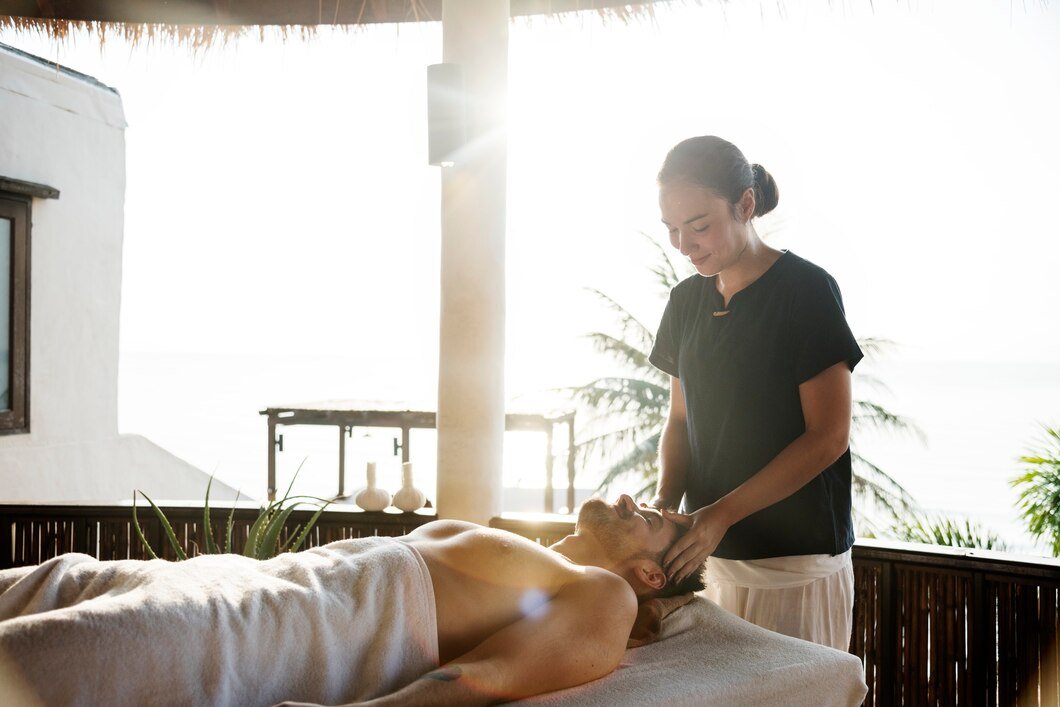Health
From Rush to Relax Using Uijeongbu Business Trip Massage Therapy for Stress-Free Living

Life moves fast With constant deadlines, endless to-do lists, and the overwhelming influx of information, many feel perpetually rushed and stressed. Fortunately, massage therapy offers a way to slow down, reconnect, and bring a sense of calm back into our lives. More than just a luxury, massage therapy provides a pathway to a balanced, stress-free existence. 의정부출장마사지 Massage therapy can help transition you from the rush to relaxation, empowering you to live with greater ease and resilience.
The Growing Need for Stress Management
As we juggle work, family, personal goals, and social obligations, stress becomes a constant companion. Around 77% of people regularly experience physical symptoms of stress, like headaches, fatigue, muscle tension, and anxiety. When stress becomes chronic, it impacts not only mental well-being but also physical health, potentially leading to issues like high blood pressure, heart disease, and weakened immunity. Massage therapy stands out as a highly effective tool for managing this stress. Unlike temporary fixes that distract or suppress stress, massage therapy addresses physical and mental symptoms directly, making it one of the most powerful approaches for achieving deep, lasting relaxation.
How Massage Therapy Helps Transition from Rush to Relax
Massage therapy’s unique ability to alleviate stress lies in its holistic approach to treating the body. The power of touch can significantly improve circulation, release muscle tension, and, most importantly, stimulate the release of feel-good hormones that leave you feeling rejuvenated. Here’s a closer look at how massage therapy moves you from a state of rush to a place of relaxation:
- Activating the Body’s Relaxation Response: One of the most immediate effects of massage therapy is its ability to trigger the body’s relaxation response, also known as the parasympathetic nervous system. This system counteracts the stress-induced fight response, lowering heart rate, reducing blood pressure, and promoting deep breathing. Through massage, the body learns to relax deeply, signaling that it’s safe to unwind and recharge.
- Releasing Tension Stored in Muscles: Stress often manifests physically in our bodies, particularly muscle tension. Tightness in the shoulders, neck, and back is familiar, especially for those who sit at desks for long periods or work in high-pressure environments. Massage therapy explicitly targets these areas, using deep tissue and Swedish massage techniques to release knots and improve circulation. When tension is released, the body feels lighter, more relaxed, and more at ease.
- Promoting Endorphins and Mood-Enhancing Hormones: Massage therapy stimulates the release of endorphins and other mood-enhancing hormones, like dopamine and serotonin. These hormones are natural stress relievers, helping you feel calm, happy, and more resilient to the pressures of everyday life. Regular massage can help regulate these hormones, allowing you to maintain a more balanced, relaxed state even in the face of stress.
- Improving Sleep Quality: Stress often disrupts sleep, leading to a cycle where poor sleep causes more stress, and more stress makes it harder to sleep. Massage therapy has been shown to improve sleep quality by calming the nervous system and relaxing the body. Better sleep, in turn, helps you feel more energized, focused, and less susceptible to stress.
- Enhancing Mindfulness and Body Awareness: Massage therapy creates a space to reconnect with your body. This experience of slowing down and focusing on how your body feels is an excellent way to practice mindfulness, which can be instrumental in stress reduction. By becoming more aware of how stress affects your body, you can recognize and address tension before it becomes overwhelming.
Different Types of Massage for Stress Relief
There are various types of massage therapy, each offering unique benefits for stress management. Here are some popular options:
Swedish Massage: Known for its gentle, flowing strokes, Swedish massage is ideal for relaxation and stress relief. It focuses on the entire body, helping improve circulation and release general tension.
Deep-tissue massage: This technique targets the deeper layers of muscle tissue and is excellent for relieving chronic tension in specific areas. It’s especially beneficial for people who experience intense stress-related muscle tightness.
Aromatherapy Massage: Aromatherapy incorporates essential oils into the massage, enhancing the relaxation experience. Oils like lavender, chamomile, and eucalyptus can calm the mind, lift the mood, and help you feel grounded.
Hot Stone Massage: Heated stones are placed on key points of the body, helping to loosen tight muscles and improve blood flow. This type of massage is particularly effective for deep relaxation and stress relief.
Shiatsu and Acupressure: These techniques focus on specific pressure points to restore balance within the body, promoting a sense of calm and well-being.
Making Massage Therapy a Part of Your Routine
To truly benefit from massage therapy, consider incorporating it as a regular part of your self-care routine. Setting aside time for regular massages, whether weekly, biweekly, or monthly, can help manage stress levels before they escalate. If time or budget constraints make frequent visits challenging, self-massage techniques, such as gentle neck or hand massages, can offer relief between sessions.
Self-Care Practices to Enhance the Benefits of Guri Business Trip Massage Therapy
Massage therapy can be even more effective when combined with other self-care practices. Here are some tips to make the most out of your massage sessions and create a genuinely stress-free lifestyle:
- Practice Deep Breathing: Deep breathing can help you stay relaxed and calm after a massage. Try taking a few deep breaths every morning and evening, focusing on releasing tension with each exhale.
- Stay Hydrated: Massage therapy releases toxins from muscles, so staying hydrated is essential to help flush them out of your system. Drinking plenty of water can also improve your overall energy levels and mental clarity.
- Engage in Regular Physical Activity: Exercise complements the benefits of massage by releasing endorphins and reducing stress. Yoga, in particular, combines movement and mindfulness, promoting relaxation and body awareness.
- Prioritize Sleep: Sleep is a priority, as it is critical in managing stress. Like maintaining a consistent sleep schedule, good sleep hygiene can significantly reduce stress levels.
- Embrace Mindfulness and Meditation: Integrating mindfulness or meditation can enhance the relaxation achieved through 구리출장안마 massage. Practicing mindfulness, even for a few minutes daily, can help you stay centered and calm.
In Summary
Message therapy is more than a fleeting escape from daily pressures. It’s a powerful tool for managing stress, building resilience, and creating a life filled with calm and balance. By transitioning from a constant rush to relaxation, you’re not just relieving tension temporarily you’re cultivating a lifestyle that prioritizes well-being. As you incorporate massage therapy into your routine, you’ll likely be more equipped to handle life’s demands with a clear mind and a peaceful heart.
Share this content:
Health
Ветеринарная клиника VetCityPets: Забота о вашем питомце на высшем уровне

Каждому владельцу домашних животных важно найти клинику, в которой их питомец получит квалифицированную помощь. Ветеринарная клиника VetCityPets — это место, где высококвалифицированные специалисты обеспечат вашему любимцу нужное лечение, уход и внимание. В этой статье мы расскажем, что делает ветеринарную клинику VetCityPets отличным выбором для заботы о вашем питомце.
Почему стоит выбрать ветеринарную клинику VetCityPets?

Когда речь идет о здоровье вашего питомца, важно доверять профессионалам. Ветеринарная клиника VetCityPets сочетает в себе опытных специалистов, современное оборудование и индивидуальный подход к каждому животному. Вот несколько причин, почему стоит выбрать именно эту клинику:
1. Профессиональные ветеринары с опытом
В ветеринарной клинике VetCityPets работают высококвалифицированные специалисты, которые имеют богатый опыт в уходе за различными видами домашних животных. Каждый ветеринар прошел специальную подготовку и регулярно повышает квалификацию, чтобы всегда быть в курсе последних тенденций в области ветеринарии.
2. Современное оборудование и технологии
Клиника оснащена передовыми медицинскими устройствами и инструментами, что позволяет точно диагностировать и лечить заболевания. Благодаря новейшему оборудованию, ветеринары могут проводить сложные обследования, лабораторные исследования и даже операции с минимальными рисками для питомцев.
3. Комплексный подход к лечению
В ветеринарной клинике VetCityPets подход к лечению всегда комплексный. Клиника предлагает широкий спектр услуг, от профилактических осмотров до сложных хирургических вмешательств, что позволяет решать любые проблемы с вашим питомцем на каждом этапе его жизни.
Услуги ветеринарной клиники VetCityPets

Ветеринарная клиника VetCityPets предлагает разнообразные услуги, которые включают как базовую помощь, так и специализированное лечение. Вот некоторые из них:
1. Профилактические осмотры и вакцинация
Профилактика заболеваний — это залог долгого и здорового жизни вашего питомца. В ветеринарной клинике VetCityPets вам предложат регулярные осмотры, вакцинацию от основных заболеваний и рекомендации по уходу.
2. Лабораторные исследования
Современные лаборатории клиники позволяют проводить широкий спектр анализов, включая анализы крови, мочи, кала и другие необходимые исследования. Это помогает точно выявить заболевания на ранних стадиях и подобрать подходящее лечение.
3. Хирургические услуги
Ветеринарная клиника VetCityPets предлагает услуги по проведению операций различной сложности, включая стерилизацию, кастрацию, а также более сложные хирургические вмешательства, такие как удаление опухолей и лечение травм. Все операции проводятся с соблюдением всех стандартов безопасности.
4. Стоматологическая помощь
Здоровье зубов и десен — важная часть общего состояния питомца. В клинике проводятся профилактические осмотры, чистка зубов, лечение стоматологических заболеваний, что помогает предотвратить многие проблемы.
5. Скорая помощь
В экстренных ситуациях необходимо быстрое реагирование. Ветеринарная клиника VetCityPets предоставляет круглосуточную помощь в экстренных случаях, будь то отравление, травма или резкое ухудшение состояния здоровья вашего питомца.
Индивидуальный подход к каждому питомцу
В ветеринарной клинике VetCityPets уделяется особое внимание индивидуальному подходу к каждому питомцу. Каждое животное уникально, и его потребности могут сильно различаться. Врачи клиники проводят детальный осмотр, учитывают возраст, породу, привычки и состояние здоровья питомца перед назначением лечения или профилактики.
Кроме того, персонал всегда готов ответить на любые вопросы владельцев домашних животных и дать рекомендации по уходу, питанию и воспитанию питомцев.
Как записаться на приём в ветеринарную клинику VetCityPets?
Записаться на приём в ветеринарную клинику VetCityPets можно несколькими способами. Вы можете позвонить по телефону, заполнить форму онлайн или обратиться к специалистам клиники напрямую. Для удобства владельцев домашних животных предусмотрены гибкие часы работы и возможность экстренной записи в случае необходимости.
Отзывы клиентов
Множество довольных владельцев животных оставляют положительные отзывы о ветеринарной клинике VetCityPets. Вот несколько из них:
- Анна, владелица кошки Муры: “Отличная клиника, врачи очень профессиональны. Моя кошка всегда в надежных руках. Спасибо за заботу!”
- Сергей, хозяин собаки Шарика: “Очень благодарен за внимание и поддержку! Мы проходили вакцинацию и все осмотры, и теперь наш питомец чувствует себя прекрасно.”
Отзывы подтверждают высокий уровень обслуживания и доверие клиентов к этой клинике.
Заключение
Ветеринарная клиника VetCityPets — это надежный выбор для заботы о здоровье вашего питомца. Современное оборудование, квалифицированные врачи и внимательное отношение к каждому животному делают эту клинику идеальным местом для вашего любимца. Не забывайте о регулярных осмотрах и профилактике, ведь здоровье вашего питомца в ваших руках.
Запишитесь на приём в ветеринарную клинику VetCityPets сегодня, и позаботьтесь о своём питомце на высшем уровне!
Share this content:
Health
The Change Healthcare Cyber Attack: Understanding Impacts Lessons

In today’s digitally interconnected world, healthcare organizations are increasingly reliant on technology to streamline operations, improve patient care, and manage sensitive data. However, with this digital transformation comes a heightened risk of cyber threats. One alarming example is the Change Healthcare cyber attack, which has raised significant concerns about the vulnerability of healthcare systems and the security of patient information.
This blog delves into the incident, its implications, and the critical lessons the healthcare industry must learn to prevent similar breaches in the future.
The Change Healthcare Cyber Attack: What Happened?
Change Healthcare, a leading healthcare technology company, plays a vital role in providing solutions for revenue cycle management, payment processing, and data analytics for healthcare organizations. The cyber attack on Change Healthcare disrupted its services and exposed vulnerabilities in its infrastructure, putting patient data at risk.
The attack is suspected to have been a ransomware breach, a common tactic used by cybercriminals to lock systems and demand payment for their release. While Change Healthcare acted swiftly to mitigate the impact and secure its systems, the attack caused significant delays in operations, financial losses, and potential data breaches that could compromise sensitive patient information.
The Impact of the Attack

1. Patient Data at Risk
The healthcare industry deals with highly sensitive information, including patient records, billing data, and personal identification details. A cyber attack targeting this data can lead to:
Identity theft
Fraudulent activities
Loss of trust among patients and stakeholders
In the case of Change Healthcare, the breach highlighted the vulnerability of healthcare systems in safeguarding patient information.
2. Operational Disruption
The attack caused temporary shutdowns and disruptions in critical services, including billing and payment processing. This not only impacted healthcare providers relying on these services but also delayed patient care, as some systems were rendered inaccessible.
3. Financial Losses
Ransomware attacks often result in significant financial losses, including the ransom amount (if paid), costs associated with system recovery, and potential regulatory fines for non-compliance with data protection laws like HIPAA.
4. Reputation Damage
For any organization, a cyber attack can tarnish its reputation. For Change Healthcare, the incident underscored the importance of cybersecurity in maintaining trust and reliability in the healthcare sector.
Lessons Learned from the Incident
The Change Healthcare cyber attack serves as a wake-up call for the healthcare industry. Here are the critical lessons organizations must take away:
1. Strengthen Cybersecurity Protocols
Healthcare organizations must prioritize robust cybersecurity measures, including:
Regular software updates and patches
Multi-factor authentication (MFA)
Intrusion detection and prevention systems (IDPS)
Data encryption to protect sensitive information
2. Invest in Employee Training
Human error remains one of the leading causes of successful cyber attacks. Conducting regular cybersecurity awareness training can help employees identify phishing attempts, suspicious emails, and other malicious activities.
3. Implement Incident Response Plans
Having a well-defined incident response plan is crucial for minimizing the impact of a cyber attack. This plan should include:
Rapid detection and containment protocols
A clear communication strategy for stakeholders
Steps to restore systems and ensure business continuity
4. Conduct Regular Audits and Penetration Testing
Routine audits and penetration testing can help identify vulnerabilities in an organization’s systems before cybercriminals exploit them. These practices allow organizations to proactively address security gaps.
5. Collaborate with Cybersecurity Experts
Engaging with cybersecurity experts and third-party security firms can provide an added layer of protection. These experts can offer valuable insights and help implement the latest technologies to safeguard healthcare systems.
The Role of Regulations and Compliance
The healthcare sector operates under strict regulatory frameworks like the Health Insurance Portability and Accountability Act (HIPAA) in the U.S., which mandates the protection of patient data. Non-compliance can result in hefty fines and legal consequences.
The Change Healthcare incident highlights the importance of adhering to these regulations and staying updated on evolving cybersecurity standards. By implementing best practices and maintaining compliance, organizations can mitigate the risks associated with cyber threats.
Moving Forward: Building Resilient Healthcare Systems
The Change Healthcare cyber attack serves as a stark reminder of the growing threat landscape in the healthcare sector. As technology continues to advance, so do the methods employed by cybercriminals. Building resilient systems requires a combination of technology, education, and proactive measures.
Key Steps for Future Preparedness:
1. Embrace Advanced Technologies
Artificial Intelligence (AI) and Machine Learning (ML) can enhance threat detection and automate responses to potential attacks.
2. Encourage Industry Collaboration
Sharing insights and threat intelligence within the healthcare industry can help organizations collectively combat cyber threats.
3. Focus on Data Minimization
Limiting the collection and retention of sensitive data reduces the potential impact of a breach.
4. Secure Third-Party Partnerships
Vetting and monitoring third-party vendors can prevent vulnerabilities introduced through external systems.
Conclusion
The Change Healthcare cyber attack underscores the urgency for healthcare organizations to fortify their cybersecurity defenses. Protecting patient data, ensuring uninterrupted operations, and maintaining trust should be the top priorities for any healthcare entity.
By learning from incidents like this, the healthcare industry can evolve to create a safer and more secure environment for patients, providers, and stakeholders. In the face of ever-growing cyber threats, proactive measures and a commitment to cybersecurity will pave the way for a resilient healthcare future.
Share this content:
Health
How to Use Lemon Juice to Remove Dark Spots

Dark spots, or hyperpigmentation, are a common skin concern. They can result from various factors such as sun exposure, aging, hormonal changes, and acne scars. While there are many commercial treatments available, natural remedies like lemon juice offer an affordable and accessible option. Packed with Vitamin C and citric acid, lemon juice has powerful properties that may help lighten dark spots and improve skin tone. In this blog, we’ll explore the benefits of using lemon juice, how it works on dark spots, and safe ways to incorporate it into your skincare routine.
Why Do Dark Spots Appear on the Face?
Dark spots form when the skin produces excess melanin, the pigment responsible for skin color. Some common reasons include:
Sun Exposure: UV rays can trigger melanin production, causing sunspots.
Aging: With age, skin becomes more susceptible to discoloration.
Hormonal Changes: Conditions like melasma, common in pregnancy, cause dark spots due to hormonal shifts.
Acne Scars: Acne can leave behind stubborn marks, especially on sensitive skin.
Benefits of Lemon Juice for Dark Spots
Lemon juice is rich in Vitamin C and citric acid, both of which have numerous skin benefits:
1. Brightening Properties: Vitamin C is a powerful antioxidant that can lighten dark spots by inhibiting melanin production, resulting in an even skin tone.
2. Exfoliation: The natural acids in lemon juice gently exfoliate dead skin cells, promoting new cell turnover.
3. Anti-Aging: Vitamin C is also known for its anti-aging benefits, as it helps boost collagen production and reduces the appearance of fine lines and wrinkles.
4. Antioxidant Protection: Vitamin C fights free radicals, which can damage skin cells and lead to premature aging.
How to Use Lemon Juice to Remove Dark Spots Safely
While lemon juice can be effective for reducing dark spots, using it incorrectly may lead to skin irritation, especially for sensitive skin types. Here’s a step-by-step guide to help you safely incorporate lemon juice into your skincare routine.
1. Dilute Lemon Juice with Water or Honey
Using pure lemon juice on the skin can be harsh, so diluting it is essential. Mix equal parts lemon juice and water or honey. Honey has additional moisturizing properties, making it ideal for dry or sensitive skin.
How to Apply: Dip a cotton ball into the diluted lemon juice mixture and apply it directly to dark spots. Leave it on for 10–15 minutes, then rinse with lukewarm water.
Frequency: Use this treatment 2–3 times a week for best results.
2. Lemon Juice and Aloe Vera Gel
Aloe vera gel has soothing and hydrating properties, which help calm the skin. Combining it with lemon juice creates a balanced mask that reduces pigmentation without causing irritation.
How to Apply: Mix 1 teaspoon of lemon juice with 1 tablespoon of aloe vera gel. Apply the mixture to your face and leave it on for 20 minutes. Rinse with cool water.
Frequency: Apply this mask 2–3 times a week.
3. Lemon Juice and Turmeric Paste
Turmeric has anti-inflammatory and brightening properties, which, when combined with lemon juice, create a powerful remedy for dark spots.
How to Apply: Mix 1 teaspoon of lemon juice with a pinch of turmeric powder. Apply this paste to your dark spots and leave it on for 10 minutes before rinsing.
Frequency: Use this paste twice a week.
4. Lemon Juice and Yogurt Mask
Yogurt contains lactic acid, which helps exfoliate and brighten the skin. When mixed with lemon juice, it becomes an effective mask for lightening dark spots.
How to Apply: Combine 1 teaspoon of lemon juice with 1 tablespoon of plain yogurt. Apply the mask evenly on your face and leave it on for 15–20 minutes before rinsing with cool water.
Frequency: Use this mask 2–3 times a week.
Important Tips for Using Lemon Juice on Your Skin
Lemon juice is potent and can cause irritation if not used correctly. Follow these tips to avoid adverse reactions:
1. Patch Test First: Before using lemon juice on your face, do a patch test on a small area of skin. Wait 24 hours to ensure no irritation occurs.
2. Avoid Sun Exposure: Lemon juice can make your skin more sensitive to the sun, leading to further darkening or irritation. Apply it in the evening and avoid direct sunlight or use sunscreen if you plan to go outside.
3. Moisturize After Use: Lemon juice can dry out the skin, so make sure to apply a gentle moisturizer afterward to keep your skin hydrated.
4. Be Patient: Natural remedies take time to show results. Consistency is key, so stick to your routine for a few weeks before assessing results.
Potential Side Effects of Using Lemon Juice on Skin

While lemon juice is beneficial, it’s not suitable for everyone. Here are some potential side effects to watch out for:
Skin Irritation: The high acidity can cause burning or stinging, especially on sensitive skin. Always dilute lemon juice and avoid using it on broken or inflamed skin.
Photosensitivity: Lemon juice increases sensitivity to sunlight, which can lead to sunburn or worsened pigmentation if not protected.
Dryness and Peeling: Using lemon juice too often may lead to dry, flaky skin. Limit application frequency and ensure proper moisturization.
Other Natural Remedies for Dark Spots
If lemon juice isn’t suitable for your skin type, here are some other natural alternatives to consider:
Aloe Vera Gel: Known for its soothing properties, aloe vera gel can lighten dark spots with regular use.
Apple Cider Vinegar: Contains acetic acid, which has mild bleaching properties to help reduce pigmentation.
Green Tea Extract: Rich in antioxidants, green tea extract can be applied topically to reduce inflammation and improve skin tone.
Vitamin E Oil: This powerful antioxidant can fade dark spots and scars when applied consistently.
Conclusion
Lemon juice is a powerful natural remedy for dark spots, offering benefits like skin brightening, exfoliation, and antioxidant protection. However, due to its high acidity, it’s essential to use lemon juice carefully, diluting it and avoiding sun exposure after application. Combined with ingredients like aloe vera, turmeric, or yogurt, lemon juice can work wonders on hyperpigmentation, giving your skin a radiant, even tone over time.
While natural remedies like lemon juice can provide effective results, it’s important to remember that they take time to work. Be consistent, patient, and, most importantly, gentle with your skin. For those with sensitive skin or severe dark spots, consider consulting a dermatologist for professional treatments tailored to your skin’s needs.
Share this content:
-

 Health7 months ago
Health7 months agoВетеринарная клиника VetCityPets: Забота о вашем питомце на высшем уровне
-

 App6 months ago
App6 months agoExperience Unlimited Entertainment with Castle APK for Android
-

 AI8 months ago
AI8 months agoUnderstanding 라마 3.1: Features, Benefits, and Applications
-

 Business8 months ago
Business8 months agoSnow Day Calculator: How to Predict School Closures
-

 Business8 months ago
Business8 months agoLand Rover Defender vs. Toyota Land Cruiser: Battle of the Luxury Off-Roaders
-

 Travel7 months ago
Travel7 months agoExplore Mega-Personal.net Travel Archives: Your Gateway
-

 BLOG8 months ago
BLOG8 months agoThe Ultimate Guide to Becoming a Car Guru: Tips for Car Enthusiasts and Buyers
-

 Fashion7 months ago
Fashion7 months agoWhy the Essentials Hoodie is a Must-Have in Every Wardrobe

Pingback: High-Risk Merchant Accounts: How HighRiskPay.com Helps Your Business Thrive - Ronaldo